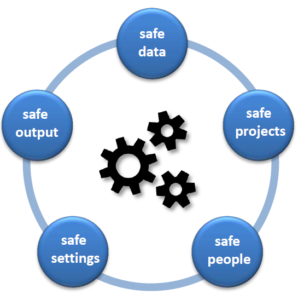The motivation of INEXDA
In 2009, the finance ministers and central bank governors of the G20 endorsed the first phase of the Data Gaps Initiative (DGI-1) to promote actions to close data gaps that had come to light in the wake of the global financial crisis that emerged in 2008. During the process of DGI-1, data users and data compilers increasingly expressed the need for improving data sharing, particularly of granular data, in order to foster the understanding of global developments, for example with regard to risks and imbalances. Consequently, the second phase of this initiative (DGI-2) contains a new recommendation (II.20) promoting the exchange of (granular) data as well as metadata.
To help meet data users’ and data compilers’ demand for (granular) data sharing within the legal framework of the individual jurisdictions and to facilitate the implementation of Recommendation II.20 of DGI-2, a group of central banks established the International Network for Exchanging Experience on Statistical Handling of Granular Data (INEXDA).
Chair

Stefan Bender
Head of Research Data and Service Center (RDSC) at Deutsche Bundesbank.
The Chair is elected every two years among all INEXDA members.
How INEXDA works
INEXDA meetings among members take place at least once per year. Guests are very welcome.
IIn addition, work is done in dedicated working groups specialized in certain aspects of granular data sharing.
A brief history of INEXDA
On 6 January 2017, the Banca d’Italia, Banco de Portugal, Bank of England, Banque de France and Deutsche Bundesbank founded INEXDA during a meeting at the Banco de Portugal, with the participation of BIS as a guest.
From 2017 to nowadays, INEXDA membership has been expanding and the updated list of members can be found on the members page : https://www.inexda.org/members
Overview of participants and important outcomes of INEXDA meetings

March 2024
12th INEXDA meeting – Videoconference
- INEXDA members
- Guests (BIS)
INEXDA status update
Working Group on Statistical Disclosure Control
The WG SC Task Force on microdata access and its (potential) relation to INEXDA
INEXDA's metadata database

July 2022
11th INEXDA meeting – Videoconference
- INEXDA members
Medium-term planning: New INEXDA Working Groups and presentation on SDMX by BIS

November 2021
10th INEXDA meeting – Videoconference
- INEXDA members
- Guests (Central Bank of Brazil, South African Reserve Bank))
Update from the Working Group on Modes of Data Provision and presentations by INEXDA members on data access related topics

March 2021
9th INEXDA meeting – Videoconference
- INEXDA members
Update from the Working Group on Modes of Data Provision and discussion on the Working Group on Harmonisation of the Data Catalogue

December 2020
8th INEXDA meeting – Videoconference
- INEXDA members
Designation of the 2021 2022 chair of the network Networking initiatives State of the workstreams

July 2020
7th INEXDA meeting – Videoconference
- INEXDA members
Workstreams INEXDA membership application process Future of the GESIS database INEXDA and the G20

November 2019
6th INEXDA meeting in Paris
- INEXDA members
- Guests (BIS, Austria, Belgium, Germany (NSI) , Greece, Mexico, UK (NSI, Data Archive, UWE Bristol))
Workstreams
Data access workstream – work in progress
Sharing experiences about data access

April 2019
5th INEXDA meeting in Frankfurt am Main
- INEXDA members (+Eurostat, Russia)
- Guests (BIS, Austria, Germany (NSI), France, (NSI), Greece, Norway (NSI), UK (NSI))
Workshop
1. Data discovery centres: providing information on where to find the data
2. Data access centres: how to grant access to the data: nationally and internationally
3. Data hubs: access to multi-source remote data
4. International initiatives on microdata access/sharing

August 2018
4th INEXDA meeting in Basel
- INEXDA members (+ECB, Spain, Chile, Turkey)
- Guests (BIS, Austria, Switzerland, Germany (NSI), Eurostat, Mexico, Russia, UK (NSI))
Data Access


January 2018
3rd INEXDA meeting in Paris
- INEXDA members (+ECB, Spain)
- Guests (BIS, Austria, Chile, Mexico, Turkey, UK (NSI))
Working groups
1. Dissemination
2. Metadata
3. ADRF
4. Modes of accreditation
5. Contracts for research projects/bodies
6. Modes of data provision
7. Output control
8. Risk management for published results

July 2017
2nd INEXDA meeting in London
- INEXDA members
- Guests (BIS, ECB, Spain)

INEXDA Metadata Tool
by GESIS

January 2017
1st INEXDA meeting in Lisbon
- INEXDA members (Germany, France, Italy, Portugal, UK)
- Guests (BIS)

Memorandum of Understanding
Signing and publication
INEXDA’s objectives
INEXDA’s overall aim is to facilitating the international use of granular data of central banks, international organisations, or national statistical institutes for analytical, research and comparative purposes within the limits set by the applicable confidentiality regimes.
Provide a basis for exchanging experiences on the statistical handling of granular data that are accessible to external users. Examples of ‘statistical handling’ include the accessibility of data and metadata, techniques for the statistical analysis of granular data, procedures for data confidentiality and security of data, and procedures for output control.
Provide a framework for investigating possibilities to harmonise procedures for accessing granular data and metadata structures, to develop comparable structures for existing data and to further foster the efficiency of statistical work with granular data.
INEXDA’s objectives are outlined in the Memorandum of Understanding (MoU), which must be signed by each member and is available on the websites of each member institution.
The higher level of data disaggregation in the case of granular data is also associated with an increased need for data protection. European and national legal provisions regulate both the user group and the access channels to microdata and oblige data providers and data recipients to maintain data confidentiality at all times. Therefore, the overriding principle of the work of INEXDA is compliant with the respective statutory secrecy and data protection requirements, and thus maintaining the confidentiality of the information submitted by the reporting agent.
